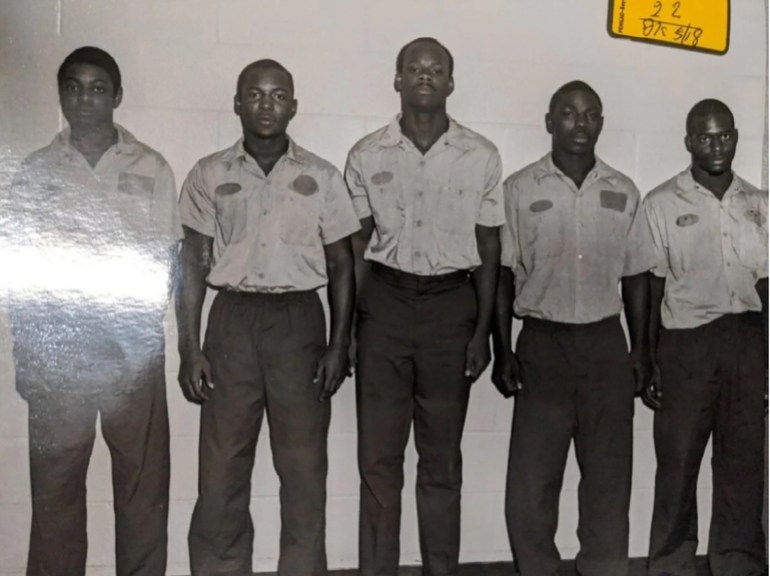While preparing for a film based on the novel "Lucky" by writer Alice Sebold about the story of her rape, the executive producer of the film suspected some of the details of the story, and after research it was found that the accused, Anthony Broadwater, who was unjustly imprisoned for 16 years, was innocent of this charge, thus turning from the perpetrator To the victim, and the artwork was turned into a documentary entitled "Unlucky" about what happened to "Broadwater".
How was Broadwater, 61, charged with a crime he did not commit?
How did he recover after 40 years of the incident?
Was Siebold unfairly accusing him, or was she also a victim of the justice system and misled?
His looks are scary
In November 1981, 5 black men wearing identical shirts stood in a room at a police station in New York, and Sebold - who was 19 years old at the time - was trying to identify who raped her. Broadwater.
"Broadwater is looking at you horribly," the assistant attorney general told her in order to deceive her.
The case was based on the victim's suspicion of Broadwater.
And an analysis of his hair using an imprecise technique, which is no longer accepted in the courts, fell victim to a biased justice system, spending more than 16 years in prison, and another 23 years classified as a sex offender.
The suspects during their presentation to the writer Alice Siebold (networking sites)
lucky
Siebold wrote her story in 1999 in the novel "Lucky", and explained how she fought to catch her rapist, and sold more than a million copies, and in 2019 it was announced that a movie based on the novel was being produced, and Netflix later began working on it.
In preparation for the film, executive producer Timothy Moshiant noted that the details were inconsistent. In his article in The Guardian, he said, "When I first reviewed the book, I had a lot of questions, and the part about Sebold trying to identify her attacker bothered me. Broadwater was suspect number 4, and Sebold chose suspect number 5, and she wrote that the two suspects looked like identical twins.
Moshiant believed that Siebold's confusion should have been the end of the case, and he informed his questions to the production team, but they confirmed that the publisher examined the book and the facts, and demanded that he trust the source material, but he refused to accept this situation, and this, along with other reasons, caused him to leave the work team.
But he didn't turn his back on the inconsistencies he noticed in Sebold's story, and he hired a private investigator, and within 48 hours they found Broadwater and learned the basic facts behind the case, and his innocence soon became clear, and Moshiant raised money and appointed lawyers to overturn his conviction.
Siebold: I offer my apologies to Broadwater and sorry that the life you could have lived was unjustly stolen from you (networking sites)
right noon
Within less than a year, Broadwater was found innocent by the court last November, after defense attorneys David Hammond and Melissa Schwartz proved his convictions were faulty, and that the assistant attorney general misled Siebold, and the two lawyers indicated that the technology used to match the two hair samples had been discredited. completely.
Broadwater trembled as he cried at the verdict of his innocence and hugged his lawyer, and said after the court, "I never thought I would see the day when I would be acquitted," and stated that he refused to have children because of his fear of bringing them into the world while their father bears the stigma that he is a sexual predator.
Sorry accepted
Sebold expressed - in a statement - her regret for what Broadwater was subjected to, and said, "I offer my sincerest apologies to Broadwater and for what he went through, and I am deeply sorry for the fact that the life you could have lived was unjustly stolen from you, and I know that no apology can change what happened to you." .
Despite the heavy losses Broadwater incurred, before Siebold's apology, he told the Daily Mail: "I am relieved that she has apologized. While the incident is still traumatic for me, this regret will help me in my attempts to come to terms with what happened."
"Her apology required a lot of courage and strength to understand that she was a victim, and that I was a victim too," he told The New York Times.
Victim or oppressor?
Although many harbor prejudices against Siebold for her false accusation, she was misled by the justice system, which also failed to deliver justice when it adopted her troubled assumptions at a time when a teenage girl was under the influence of devastating trauma.
In his article, Moshiant wondered who should be blamed in this case: Siebold, or the American justice system?
Or both?
"I don't think Siebold, who was an 18-year-old rape victim, bears any blame," he said. "She was doing her best, guided by an unscrupulous assistant attorney general."
However, he put some of the blame on Siebold when she wrote her novel, as she reviewed the entire case file before writing the book, and asked, "Didn't you realize after all these years that suspects 4 and 5 are not the same in appearance? Didn't she have the opportunity to acquit the accused then."
He denounced the failure of the American justice system, saying, "The assistant attorney general should never accept a claim in which the victim cannot identify the suspect, and this is not only a failure by that individual, but a failure of every legal official involved in this case."
Moshiant announced the production of a documentary titled "Unlucky" to tell what Broadwater has been through all these years, and his efforts to rebuild his life.

